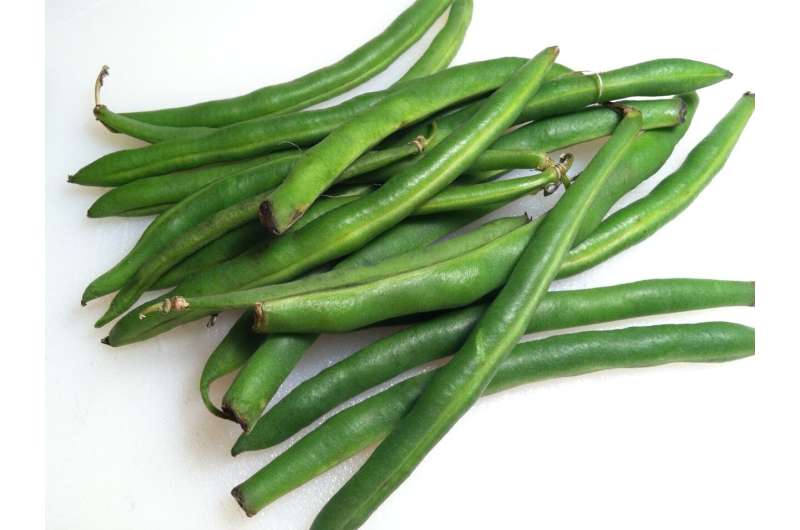This article has been reviewed according to Science X's editorial process and policies. Editors have highlighted the following attributes while ensuring the content's credibility:
fact-checked
trusted source
proofread
Less meat, more foods of plant origin: New Nordic Nutrition Recommendations published

A new edition of the Nordic Nutrition Recommendations, NNR, was published this week. For the first time, they contain scientific recommendations on a diet that is good not only for our health, but also for the environment. In the new edition, the recommendation is to favor an increasingly plant-based diet, to eat more fish, and to cut down on red meat.
Professor of Nutrition Therapy Ursula Schwab of the University of Eastern Finland was a member on the committee that oversaw the updating of the NNR. Associate Professor Jyrki Virtanen, Senior University Lecturer Arja Lyytinen, Professor Emeritus Matti Uusitupa and University Lecturer Maria Lankinen of the University of Eastern Finland also contributed to the writing and evaluation of the new recommendations.
The Finnish National Nutrition Recommendations will be updated on the basis of the new NNR. According to Schwab, who was also involved in the drafting of the previous Nordic edition, they provide an excellent basis for updating the national recommendations.
"The NNR are now more detailed with regard to certain nutrients, and these changes will be taken into consideration in our national recommendations as well. The more detailed nutrient recommendations will also advise our food group level recommendations, while observing Finland's country-specific characteristics," Schwab says, describing the work that lies ahead.
The sixth edition of the Nordic Nutrition Recommendations is the largest update in the 40-year history of the report. It summarizes today's most comprehensive scientific knowledge on what constitutes good food both for health and for the planet.
The recommendations are based on the best available research knowledge on food intake, health and the environment, showing that in most cases, healthy food is also good for the environment.
A predominantly plant-based diet is recommended
The health effects of 36 nutrients and 15 food groups were studied for the 2023 Nordic Nutrition Recommendations.
The report recommends a predominantly plant-based diet that is rich in vegetables, fruits, berries, pulses, potatoes and whole grains.
In addition, the report recommends a high intake of fish and nuts, a moderate intake of low-fat dairy products, a limited intake of red meat and poultry, and a minimal intake of processed meats, alcohol and refined foods rich in fat, salt and sugar.
The new Nordic Nutrition Recommendations were published on 20 June 2023 by the Nordic Council of Ministers. The 2023 NNR report is the result of a four-year effort involving hundreds of Nordic and international researchers. The methodology is in line with international standards, and the publication of the report was preceded by a transparent process. All chapters were publicly circulated for comments over an eight-week period.
Each country will ultimately decide how to implement the NNR as they formulate their national nutrition recommendations, where consideration can be given to national priorities and circumstances. In Finland, the National Nutrition Recommendations will be updated in 2024 and for this purpose, the National Nutrition Council of Finland will appoint an expert working group.
Facts: Nordic Nutrition Recommendations 2023 (NNR 2023)
- The recommended intake or reference value of the following nine nutrients has changed significantly from the previous edition: Vitamin E, vitamin B6, folate, vitamin B12, vitamin C, thiamin, calcium, zinc and selenium.
- Pulses: Higher intake is recommended, especially for environmental reasons.
- Alcohol: Since no safe threshold can be established for alcohol, the NNR2023 report recommends that everyone should avoid alcohol. Possible use should be very moderate. This recommendation also applies to women who are breastfeeding. A more restrictive recommendation (full abstinence) is recommended for children, adolescents and pregnant women.
- Cereals: Higher intake of whole grains is recommended due to health effects and environmental impacts. It is recommended to have an intake of at least 90 g/day of whole grains.
- Vegetables, berries and fruits: It is recommended to have an intake of 500–800 g/day or more of different vegetables, berries and fruits.
- Fish: Higher intake of fish from sustainably managed stocks is recommended due to health effects and environmental impacts. It is recommended to have an intake of 300–450 g/week of fish, of which at least 200 g/week should be fatty fish.
- Red meat: For health reasons, it is recommended to limit the intake of red meat to no more than 350 g/week. The intake of processed red meat should be minimal. For environmental reasons, the intake of red meat should be considerably lower than 350 g/week.
- The Nordic Nutrition Recommendations form the scientific basis for the national nutrient intake recommendations and food recommendations of the Nordic and Baltic countries.
- International cooperation between the Nordic countries has resulted in five previous editions of the recommendations, the first of which was published in 1980.
- The previous edition from 2012 has been downloaded more than 300,000 times by decision-makers, researchers and students.
More information: Nordic Nutrition Recommendations 2023: www.norden.org/en/publication/ … recommendations-2023




















